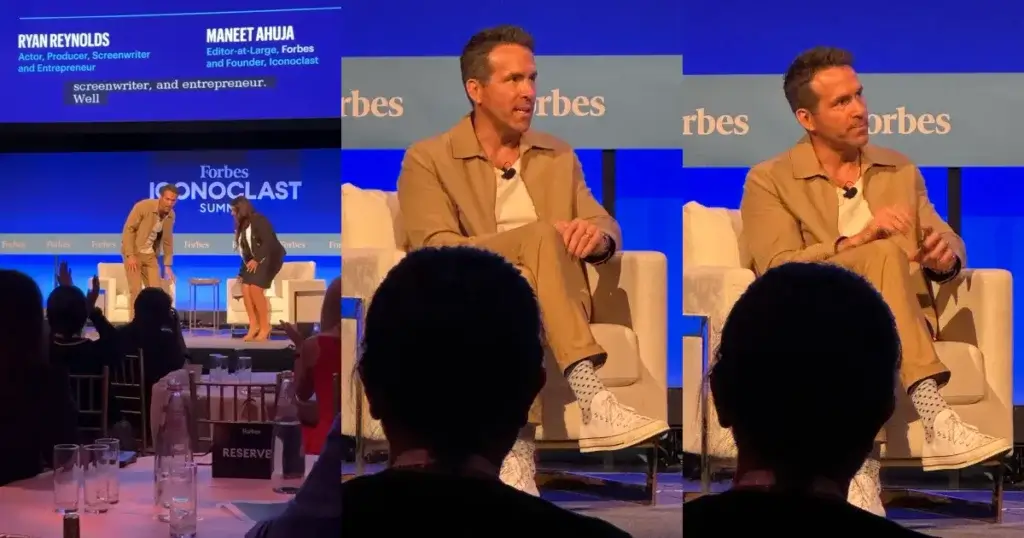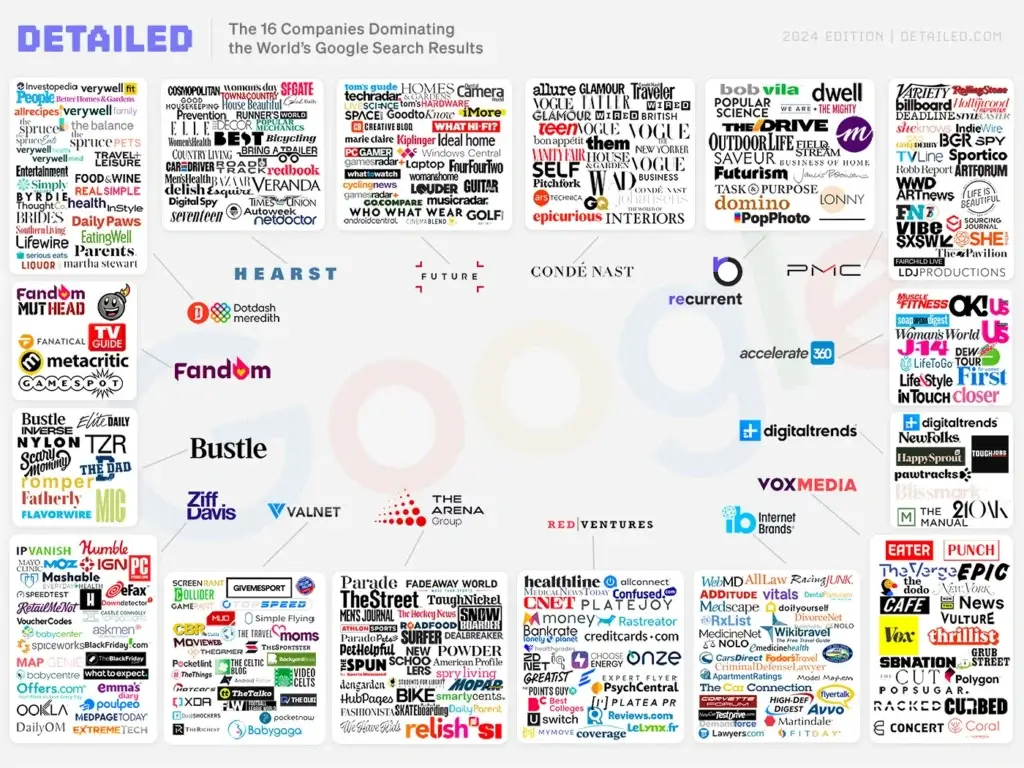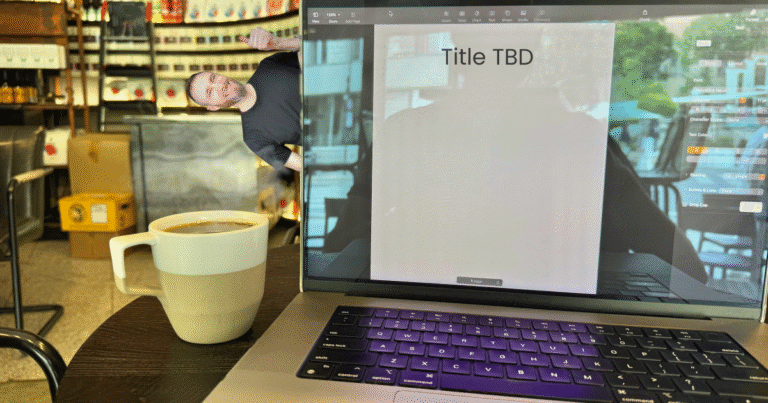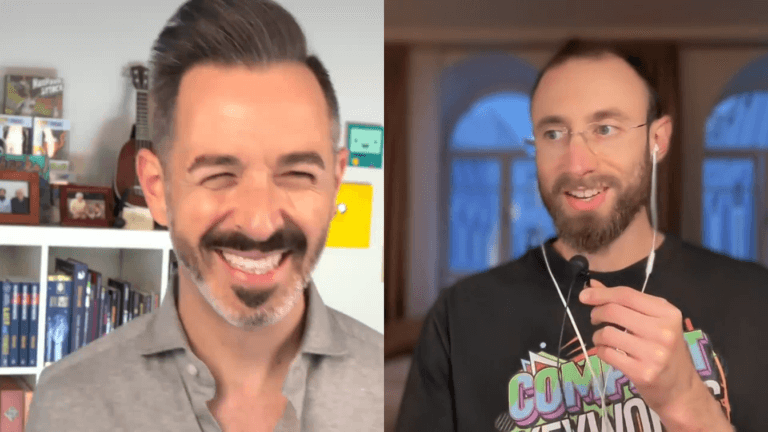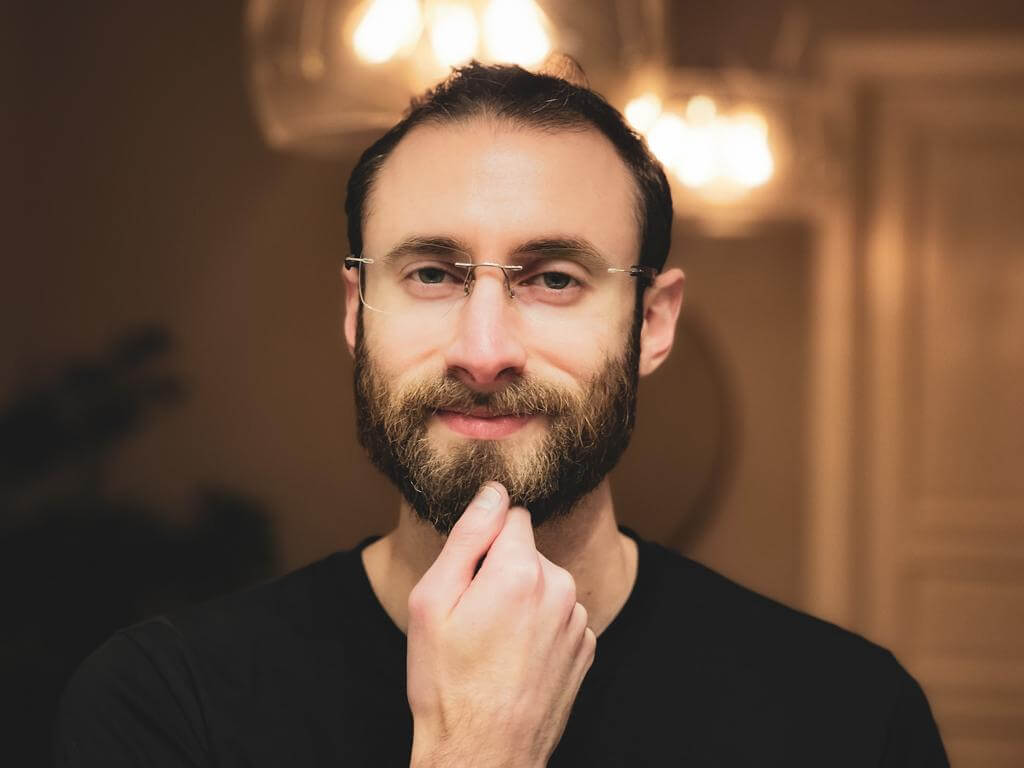A few weeks ago I attended the Forbes Iconoclast Summit in Lower Manhattan.
There were over 20 trillion dollars – $20,000,000,000,000 – a really crazy number – assets under management in the room… and only 200 attendees here. Honestly, feels even crazier just writing it.
I even got to meet Steve Forbes.
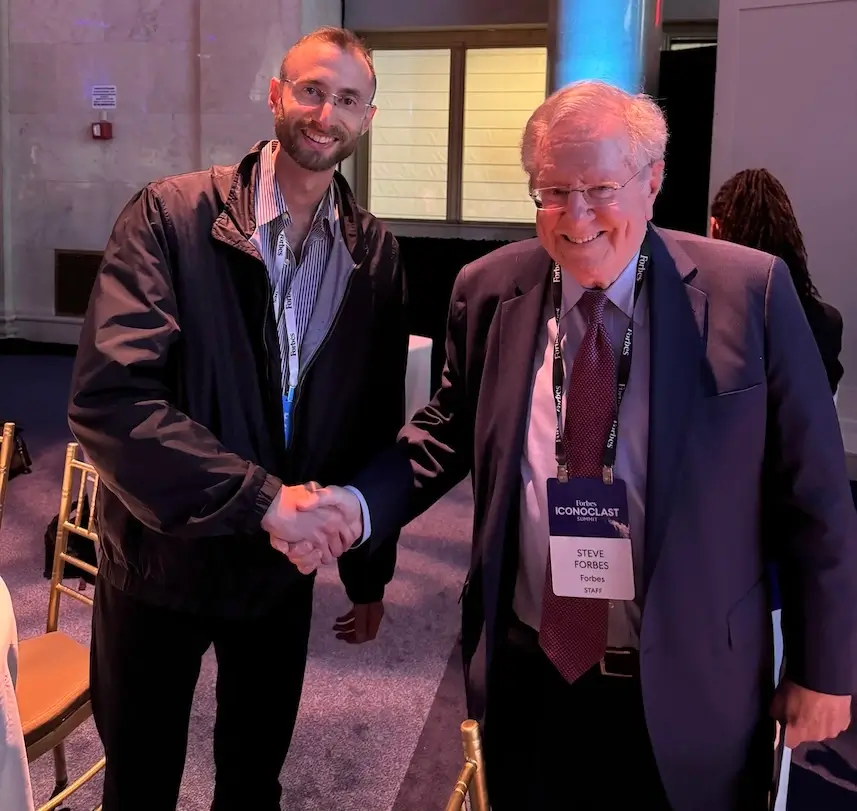
I got a seat up front and learned some awesome things from some awesome guests.
This article is some of those things I learned.
Ryan Reynolds
Ryan Reynolds was last to speak. He spoke for about 30 minutes and said so much good stuff.
The heading image of this article is a few pictures I took of him.
I made a video about how he uses storytelling in his marketing. The video’s up to 1.2 million views.
Here’s what he said (watch him say it in my video here or read it below):
Storytelling is one of the most undervalued tools in scaling businesses.
Most of the people in this room have forgotten more about investing money in the last 30 seconds than I will ever know in my entire life. But the thing I will bet on 10 times out of ten is emotional investment.
To me, emotional investment can fortify a business or a brand in really interesting and unique ways.
If your brand has an emotional connection with culture, with its audience/consumer then you have a moat that is around your brand, making it incredibly resilient, something that could inevitably become timeless.
Brands that sort of lack an identity or a stance, they’re much more vulnerable to the changing financial landscape.
I actually believe Ryan Reynolds’ business acumen is pretty solid and not due only to his preexisting fame. This is from Yahoo Finance, “His ventures he co-owns or sold, spanning various industries, are collectively valued at approximately $14 billion, according to Forbes. His portfolio includes an F1 team, a football club, an alcohol brand, a wireless provider and an advertising agency.”
Something else he does well is what Ryan Holiday, author of the legendary marketing book Trust Me, I’m Lying, calls newsjacking. This is a very reliable strategy for getting attention.
Ryan Reynolds calls it Fastvertising. Here’s him explaining it (watch here or read it below).
If you can create something that speaks to a cultural moment, which is something we call Fastvertising at my marketing company, the talk around the proverbial digital water cooler might be whatever happened in the news two days ago, but if you can hijack that moment with your brand, suddenly your brand becomes the digital water cooler conversation.
You want people to share your story.
In order for them to share the story of your brand, they want to feel like they have some authorship.
It really is a unique way to judo that energy.
I’m actually doing newsjacking/fastvertising with this article. Ryan Reynolds is trending now because of the release of Deadpool & Wolverine two days ago. I just used Ryan Reynolds’ trending status to make this article more culturally relevant and more engaging.
Jay Penske
Google Search is a huge place and there’s tons of opportunity. From DemandSage:
- Google caters to 8.5 billion searches every day, which is equivalent to 99,000 search queries every second.
- 15% of Google searches are unique, which constitutes 1.275 billion unique queries every day.
With this said, the law of the vital few, otherwise known as the Pareto Principle, also applies to Google. 20% of companies get 80% of the clicks and within that 20% there’s only 16 companies that really dominate.
This image is from one of my favorite SEO sites, Detailed.com. They have a famous article, “How 16 Companies are Dominating the World’s Google Search Results (2024 Edition).”
How is this related to the Forbes Iconoclast Summit?
One of the speakers was Jay Penske, founder of PMC in the top right corner of the above image.
Here’s how big PMC is:
PMC successfully owns and operates an ever-growing constellation of iconic brands, which includes Variety, Rolling Stone, The Hollywood Reporter, Billboard, Billboard Music Charts, WWD, SHE Media, Robb Report, Deadline, Sportico, BGR, ARTnews, Fairchild Media, Vibe, IndieWire, Dirt, Artforum, Gold Derby, Spy.com and Luminate, the premier music SAS data and analytics company. Penske Media also owns Dick Clark Productions (DCP) the world’s largest producer and owner of televised live entertainment programming, which includes the Academy of Country Music Awards, Golden Globe Awards, American Music Awards, Billboard Music Awards, New Year’s Rockin Eve, Streamy Awards, and television programs such as So You Think You Can Dance. In addition, PMC owns several vital cultural events such as SXSW, LA3C, Life is Beautiful, Latin Music Week and ATX Television Festival. In addition, Penske Media is the largest shareholder of Vox Media.
– From the PMC website.
I really loved what Jay Penske, the founder, said.
Bill Gates says the same thing, “Most people overestimate what they can do in one year and underestimate what they can do in ten years.”
Here’s what Jay Penske said (watch here, read below):
When you have a long trajectory – you really believe you want to own this business 25-50 years from now – you’re making decisions that are so much healthier for the near-term success of these brands.
I’m out for building not fleeting businesses, but generational assets.
What really stood out here is how he said the best way to get short-term successes is to have a long-term mindset and to choose things you’d be happy working on for a long time.
And he followed his own advice. He founded PMC 19 years ago.
Jon Gray
Jon Gray is the President of Blackstone (not to be confused with BlackRock), a private equity firm with over $1 trillion assets under management.
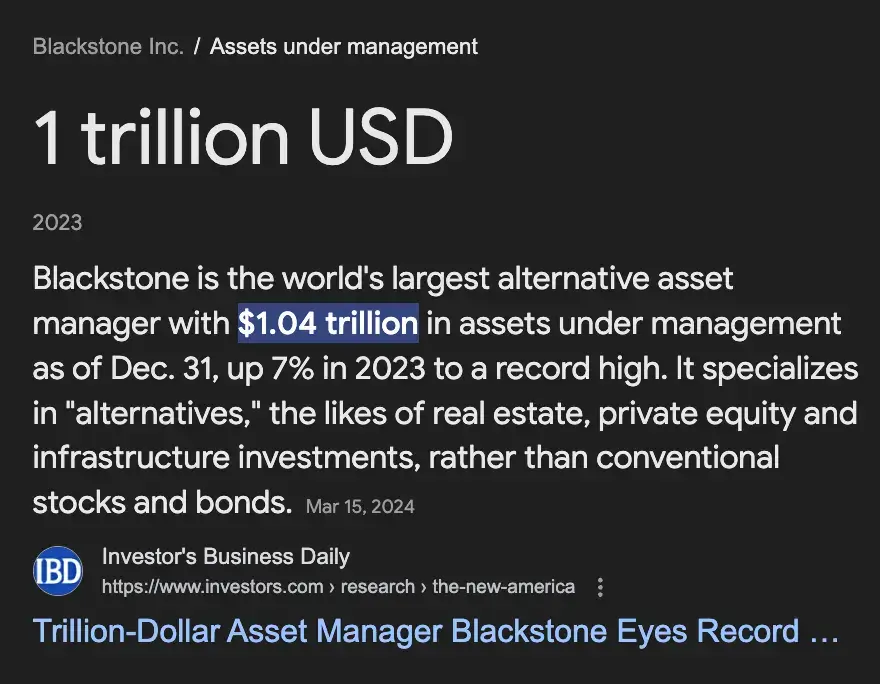
A hot topic at the event (and everywhere else) was AI. Every speaker was asked about AI.
I thought Jon Gray had an interesting response (watch here, read below):
If you think about AI, the physical manifestation is the data center. We own across our portfolio companies, either existing or under construction $50 billion, we have another $50 billion of data centers in various stages of development.
This is driven by the demand from the major tech companies. We did a big $7.5 billion loan for a data center cloud company. We’re trying to find all these derivative plays. At our portfolio companies, we’ve been using predictive AI, which is basically numbers in, numbers out for a long time.
We have a large data scientist team with 50 plus people who help companies think about pricing and staffing and so forth. We, like everybody else, are trying to figure out how to use generative AI. How to use the images, the sounds. We own a company, Ancestry, the family history business. Imagine typing in your name, not just seeing a two dimensional thing, but some sort of movie created, sound, the newspapers of that day, the whole thing pulled together quickly. Think about the tools for software and other media businesses. I would say for us, like everybody, we’re moving quickly to try to figure it out, but there’s a long way to go.
The predictive stuff was much easier. We’re trying to make the use case across our companies with generative AI.
Everybody today is thinking about AI.
But I think it’s rare to get the perspective of somebody who literally manages over a trillion dollars and hundreds of billions of dollars worth of AI data centers.
More speakers
If you liked this, I’ll be sharing more I learned from this event in future articles. The speaker list was crazy:
Ryan Reynolds, Vinod Khosla, Steve Forbes, Jonathan Gray, Michael Strahan, Lindsey Vonn, Nelson Griggs, Jay Penske, David M. Rubenstein, Mary Callahan Erdoes, Andreas Halvorsen, Dambisa Moyo, Harvey M. Schwartz, Todd Boehly, Moira Forbes, Randall Lane, Steven Bertoni, Maneet Ahuja, Sonia Gardner, and many more.
And here’s a TL;DR of the lessons in this article:
- Use storytelling in your marketing.
- Capitalize off trending events to get more visibility, engagement, and word of mouth.
- Predictive analysis AI is hyper-useful for making money. Generative AI is hyper-useful for getting engagement.
- My favorite lesson: Think long-term. Ridiculously, obnoxiously long-term. Paradoxically, it’s the best way to get short-term success.

